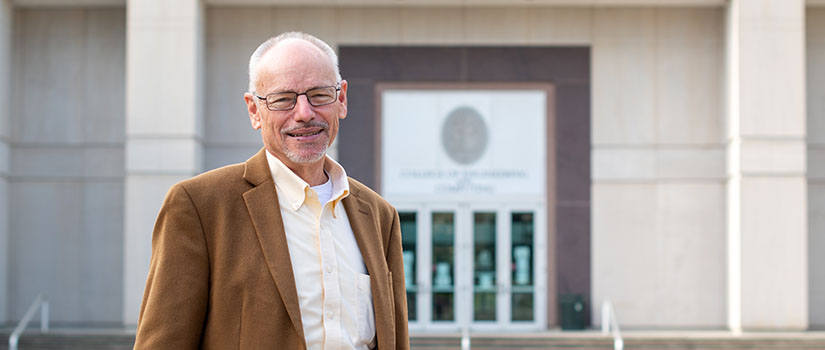Professor Roger Dougal admits he was the logical choice to become Electrical Engineering Department chair in 2012. He was the senior member of the faculty, had previously served as associate chair, and served on nearly all the departmental committees. Those roles provided him with the perspectives needed to accomplish the duties of department chair. As Dougal steps down as chair nine years later, he reflects on his position and all its unexpected twists and turns.
The first and last few years were particularly challenging. Soon after becoming chair, the dean at the time suffered a serious medical condition and was out of service for nearly a year just as the college was entering a financial crisis.
“I thought, ‘Great, this is probably the worst possible time in my 30 years here to be a department chair,’” Dougal says. “And then everyone knows about the COVID-imposed challenges of the past two years. So yes, it has been interesting. In between the first years and the last years, a lot has happened.”
When Dean Hossein Haj-Hariri arrived at the college in 2016, Dougal had one year remaining in his first term as chair and was planning to pass along the responsibility to someone else. But Haj-Hariri encouraged him to remain as chair and, encouraged by the dean’s ambitious plans, Dougal accepted reappointment for another five years.
Dr. Dougal has routinely run one of the largest research programs in the college and has continued carrying a heavy design and other teaching loads. I have personally benefitted immensely from Roger’s vast institutional and academic knowledge, and his ability to analyze the success potential for various academic or other proposals.
- Hossein Haj-Hariri, Dean
During his years as chair, Dougal led the Electrical Engineering Department to a successful re-accreditation and continued some large-scale research activities. He also chaired three international conferences and served on international advisory committees.
Dougal is especially proud of the accomplishments of the faculty during his tenure. Although leading faculty members has often been compared to herding cats, Dougal believes his experience was better than most. “That has generally not been a problem. I’ve had a great group of faculty to work with, and it has been easier to lead them than others made it out to be,” Dougal says.
One of Dougal’s emphases as chair was to encourage more collaborative research projects and joint ownership of research facilities. The collaborations have enabled some teams to work on larger research projects.
“Shared facilities and technical collaborations have been extremely successful in the Power and Energy research group,” Dougal says. “Over the past 25 years, that group has had the largest and most consistent research funding, and I’m proud to have been associated with that group over these many years.”
Among Dougal’s other accomplishments are several multi-million-dollar research awards from the U.S. Navy related to electrification of Navy ships, and design and simulation tools for revolutionary new systems. A new research program will also address the use of digital twins (virtual representations of objects or systems) for managing electronic power distribution systems. This project includes partnerships with defense companies, which lends value for the participating students. Several graduates from the group have been hired by companies involved in this research. He expects existing and new partnerships will continue going forward.
Not all of Dougal’s funding has been research-based, some addressed improvements in the educational process. “We received funding from the Department of Energy for a first-of-a-kind program to develop and share coursework across a dozen universities,” Dougal says. “We really pushed the distance-delivery and collaboration process, and in a nice turn of serendipity, that helped us to be more ready when the COVID crisis hit.” By the end of the five-year program, it was common to see universities share coursework, even in other disciplines.
As Dougal’s time as electrical engineering chair ends, he will lean on a personal experience as he lets go of responsibilities.
“When I was commodore of the Columbia Sailing Club, it seemed that many of the past commodores still participated in board meetings for the next five or 10 years. They always had their fingers in things,” Dougal says. “But when I finished my term as commodore, I was happy to walk away and let other people lead. I was confident that there were plenty of others who were capable of getting things done.”
Professor Dougal will use the same approach now.
“I have a lot of faith in Professor [Mohammod] Ali. I will give him my support whenever he asks for it and maybe warn him before he encounters an obstacle. But for the most part, I'm just going to let him manage. You need to let new people do new things. He will be great at it.”
As he approaches his 40th year at the college, Dougal plans to continue his teaching and research. But he is grateful for his time as department chair.
“Some department chairs seem to leave a bit bitter – it’s a tough job – but I've always said I don't want to be that kind of person,” Dougal says. “I’m glad that I had a chance to serve, and I hope that things are better now than when I started. It’s time for the next person to take it from here.”
